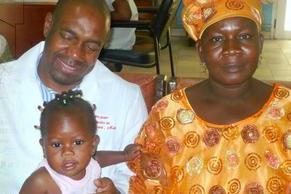University of Maryland School of Medicine (UMSOM) researchers, as part of the Infectious Diseases Clinical Research Consortium (IDCRC), have provided an interim analysis showing that the pentavalent (NmCV-5) meningitis vaccine is safe for use in 9-month-old infants in the meningitis belt of sub-Saharan Africa.

They presented their results to the World Health Organization’s (WHO) Strategic Advisory Group of Experts (SAGE) on Immunization on September 26.
SAGE recommended that all countries in the African meningitis belt introduce the novel pentavalent meningococcal conjugate vaccine targeting serogroups A, C, Y, W and X (Men5CV) into their routine immunization programs in a single-dose schedule at 9 to 18 months of age.
Public health concern
Meningococcal meningitis, caused by invasive strains of Neisseria meningitidis bacteria, is a major public health concern in sub-Saharan Africa because it causes high rates of death and permanent disability. Case fatality during meningococcal meningitis epidemics can surpass 15 per cent, and rates of long-term complications among meningitis survivors in Africa are twice as high as in high-income countries.

Because of the rapid onset of invasive bacterial meningitis and difficulties in accessing care in the African meningitis belt, prevention by vaccination is the optimal way to reduce meningitis cases.
Receiving WHO approval could lead to a monumental shift in the burden of meningitis in susceptible parts of Africa. “I’m excited to lead this critical clinical study of a vaccine that has the potential to curtail invasive meningococcal disease from the meningitis belt,” said Wilbur Chen, MD, MS, professor of medicine at UMSOM’s Center for Vaccine Development and Global Health (CVD) and protocol chair for this study.
Infant study
Study participants included infants randomized to receive a meningococcal vaccine at 9 months. Infants randomized to the 9-month age group were then further randomized in a 2:1 ratio to receive a single dose of the experimental meningococcal vaccine (NmCV-5) or a single dose of the comparator meningococcal vaccine (MenACWY-TT, Nimenrix). The interim results of the 9-month-old infants found NmCV-5 is proven to protect against meningococcal serogroups A, C, W, X, and Y. These are all epidemic-causing strains currently circulating in the African meningitis belt in young infants.
NmCV-5 can be stored at room temperature for up to 12 weeks and is affordable for African countries. NmCV-5 has already been found safe and immunogenic for people ages 1 to 29 in Africa.
“This collaboration among global partners that has resulted in the development of a safe, effective and inexpensive vaccine brings us one giant step closer to more effectively preventing the devastating epidemics of meningococcal meningitis in sub-Saharan Africa,” said Karen Kotloff, MD, professor of pediatrics, associate director for clinical research in UMSOM’s CVD, and principal investigator of the UMSOM VTEU. Researchers at the Vaccine Treatment and Evaluation Unit (VTEU) at UMSOM are performing the study in partnership with the Center for Vaccine Development-Mali (CVD-Mali).
Topics
- Bacteria
- Center for Vaccine Development-Mali
- Economic Equality
- Infectious Diseases Clinical Research Consortium
- Karen Kotloff
- Men5CV
- MenACWY-TT
- Middle East & Africa
- Neisseria meningitidis
- Nimenrix
- NmCV-5
- One Health
- pentavalent meningococcal conjugate vaccine
- Research News
- University of Maryland School of Medicine
- USA & Canada
- Vaccinology
- Wilbur Chen
- World Health Organization







No comments yet